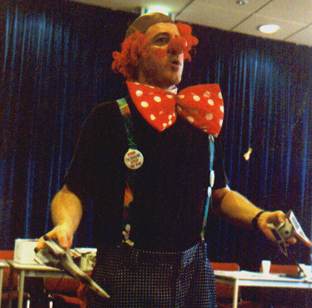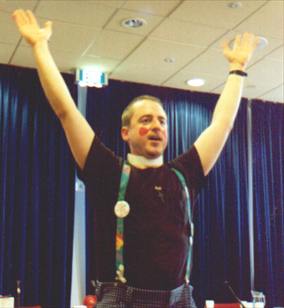BAFA © 2010. All material here is copyrighted. See conditions above. |
Ben Roberts
actor / theatre director, U.S.A.
|
 
Ben Roberts performing A Clown, A Hammer, A Bomb and God at the Hague Appeal for Peace, 1999. Photographs: Sonja van Kerkhoff |
I´m pretending I’m living in Kiev and saving up my paycheck for months until I have enough money for an Arch Deluxe.
My salary isn´t keeping up with inflation, there aren´t enough jobs anyway, the food and water is suspect ever
since the
Chernobyl plant blew up, and the future looks lousy. So why are those Americans spending all the treasures of the world to
threaten me? Why are they still pointing missiles at me? If I were living in Kiev, I´d personalize it. I’d start saying
´What’s wrong with these people?´. I´m ten feet away from the silo that holds the death sentence for everyone
within thirty miles of Kiev. None of us want that missile to fly over and blow up the city of Kiev. Do we? I said, DO WE?
Well, your name is on the missile. And so is mine. It says US right on it. If you´ve been paying taxes and living in
the confines of the law, you can´t pretend you didn’t think the missile going off over Kiev was a good idea. You can’t even
pretend, the way the German civilians did after World War II, that you didn´t know what your government was doing in
your name. Even if you don´t read papers or watch television, you can´t say you didn´t know anymore. I TOLD YOU.
After today, you´ll never be able to say you didn´t know. You´re welcome.
Text from the play, A Clown, A Hammer, A Bomb and God, written by Daniel Kinch and performed by Ben Roberts
Interview with Sonja van Kerkhoff, May,1999.
"I tell people that the only two playwrights I work with are Dan and
Shakespeare, and Shakespeare won’t return my calls!
The work I do with Dan, which involves co-directing and co-producing, as much as performing on stage,
is issue-oriented, faith-based, often comedic, and always political.
I live in New York City. I was waiting tables, doing the odd acting jobs, going to the right acting classes, doing all the
networking stuff to get casting directors to take notice of me, and was getting sick of the rat race way of living. Then
in 1996, I met Dan. Dan´s work not only appealed to me because of the subject matter but also because of the way we
worked together."
During the 7-8 years prior to that, Ben was associate director with Kim Johnson, who was the artistic director,
in a theatre called Artists In Search of...
Inc. They gave free acting classes to teenagers on Saturdays for 8-10 week sessions, which ended with them putting on a
show. To raise money to fund their work, Kim did solo performances for cabaret shows, sought grant money. She also taught in
those acting Saturdays classes.
1992 to 1994 were very hard years for everyone in the arts in the US because the government cut a lot of funding for the
arts. In response to this they started the Playwright’s Lab, in which they offered to work any playwright´s piece into a
production, so that unknown writers and new work could be developed. This was advertised in Backstage, a New York community
theatre magazine and had offers from all over New York state. The program ran for two years until Kim decided to stop
and devote herself to full-time motherhood.
Their approach in developing a playwright’s work from scratch to full-length production was to involve everyone from all
aspects of the production, from actors to stage design people. Everyone gave the playwright feedback on the piece, who
then went and worked on it further. In the first year one playwright withdrew his piece after eight weeks of work because
he wasn´t happy with the way the piece was developing. They worked with two playwrights each year for the two years,
and each of these efforts resulted in one performance of the work. It was very successful in that there was always a full
house, but in New York such small theatre productions are on every street corner! So while they hardly made any ripples in
the New York theatre world, they fulfilled our aim to develop new work for unknown playwrights.
In the second year Daniel Kinch came with the idea (and all his background research) for the play, Petra Kelly
Speaks To Power. She was one of the co-founders of the German Green Party in East Germany.
Ben directed Dan’s play and ended up acting in it because, two weeks prior to the show, an actor dropped out
(Everyone was a volunteer in all of the productions.). Dan was very active in submitting his work for various events and
the third meeting he asked if Ben would perform in a twenty minute play for a cabaret evening. The play was a comic satire
of the New York mayoral office, in which the Marx brothers symbolized the main characters in the political issues of the
time. One of these issues involved the mayor’s decision to use the New York City Police for high school security. Ben played
Chico, the one with the bad Italian accent in the suit two sizes too small.
´What taxes? I got an uncle that lives there.´
Before long Dan was inviting Ben every 6-8 weeks to participate in some show, as director or actor, and in other
aspects of
production such as a casting or staging. After a year or so, they were collaborating on many projects. Then in late ´96
Dan came up with an idea for a play for the first New York City Fringe Festival in ´97. He wanted to do a play
about someone involved in the Plowshares Movement (a movement in which
individuals perform acts of civil disobedience directed at disarming nuclear weapons plants) and wanted to use the story
of Carl Kabat, a Catholic priest, who
dressed in a clown suit and used bolt cutters to cut
his way into a nuclear missile plant on Good Friday (April Fool´s Day) in 1994.
I’m here to be a fool for God. I´m here to make a joyful noise.
(He takes out the horn and honks it several
times. He then speaks, honking the horn for punctuation/in time with Amazing Grace)
Praise God, Praise God, Praise God, Praise GOD,
Praise God, Praise God, Praise God...
Praise God, Praise God, Praise God, Praise GOD,
Praise God, Praise God, Praise God...
(He stops after a long series of honks)
That may be annoying to some of you. We’ll stop. But remember the lyrics in case it comes up later. ...
And I’m tired of preparing for this day. I’ve been praying and thinking about this moment. For months this moment has come
to me and now...it’s here. My task is to make the unholy holy. Or at least to disarm it as best I can.
from A Clown, A Hammer, A Bomb and God.
The play was chosen by the producers at the festival to be part of the best of the fringe, which meant moving to
another theatre and nine more performances. Since then they have done about 60 performances (12 productions),
and every time they have performed it have been invited to do it again elsewhere.
So they haven´t needed to hunt for a new
venue. Generally it is performed for peace-oriented groups, which is really preaching to the converted. At first Ben had
reservations about this, but when he saw how much these people loved the play, he realised that celebrating their beliefs
and making them laugh at the same time was important too. Ideally, he would love to do this performance for teenagers not
particularly interested in peace, to get them thinking about these issues, and tell the story of the Plowshares
Movement to those who have not heard of it before.
At the moment Dan is working on another piece to contrast with this one - another 50-minute piece to make the performance
a show for a full evening. Here he wants to portray a person from a very different perspective, such as a character more
interested in imperialist nationalist interests than in all of humanity....
...Ben got into theatre indirectly. In high school the drama teacher talked him into auditioning for the play, Taming of the
Shrew, which he was producing. Ben didn’t trust teachers in those days so he considered it a feat that the teacher
managed to convince him to
give it a go and Ben ended up with the part of Baptista (the Shrew’s father). Then Ben went to college and started as a
psychology major. He saw a poster for an open audition and since he´d had so much fun in the highschool production, he
showed up and got one of the lead roles in A Man for All Seasons (The Story of Thomas More). He played the
Common Man who tells the story and also plays various characters in the play. That was in 1980, and he has been doing it
ever since...
Ben has studied with the renowned New York actor, Alan Langdon, for the last 10 years... He started
working on Hamlet two and half years ago in his classes, just as an exercise.
"Hamlet is substantial enough that you can
work on it for years. By summer 2000 or 2001 I hope to be ready to perform it. I feel I am old now at 37 years, as an
American actor, to give it a good go.
I have learnt so much working on Shakespeare, the history, and the times.
As an artist in the theatre, finding myself in Hamlet is very important. An actor picks it up and discovers that this part
is in me and spends the next six months or six years becoming one with it and growing to know what the character is about.
In actuality I am finding what I am about. I am just using Shakespeare’s words to find myself."
Check out the website: http://www.interport.net/~danmk
for more about Daniel Kinch’s plays and the Ploughshares Movement.
Excerpts from pages 6 - 7, Arts Dialogue, June 1999, interview with Sonja van Kerkhoff.
|

Arts Dialogue, Dintel 20, NL 7333 MC, Apeldoorn, The Netherlands
email: bafa@bahai-library.com
|
|

